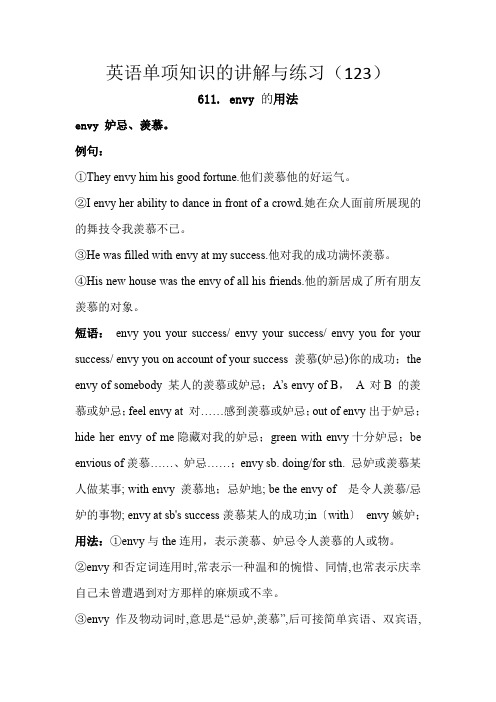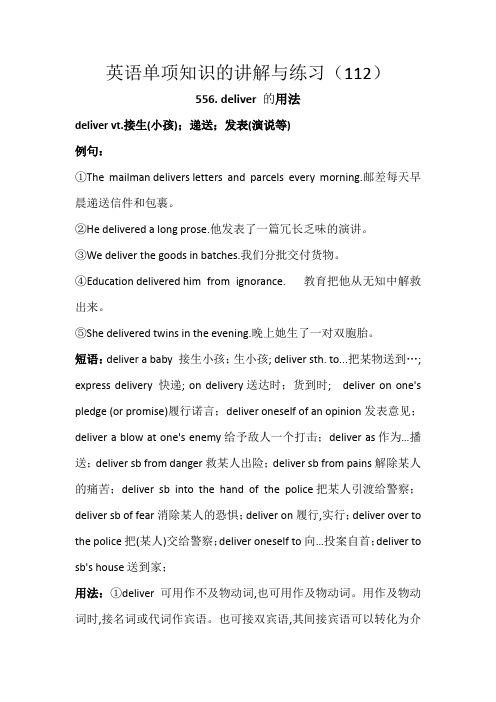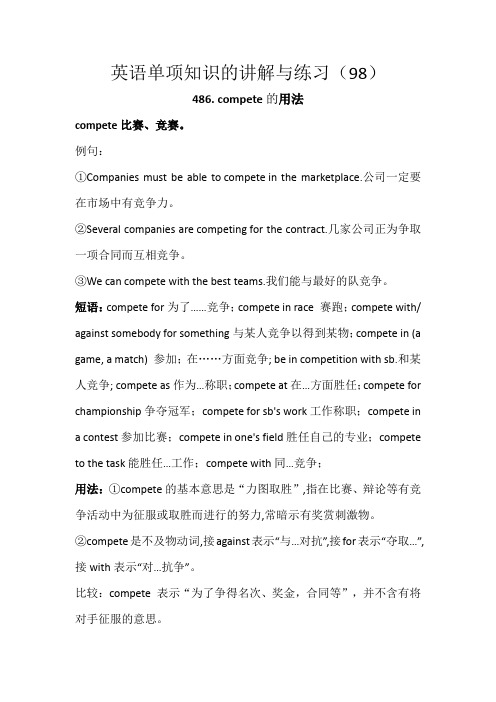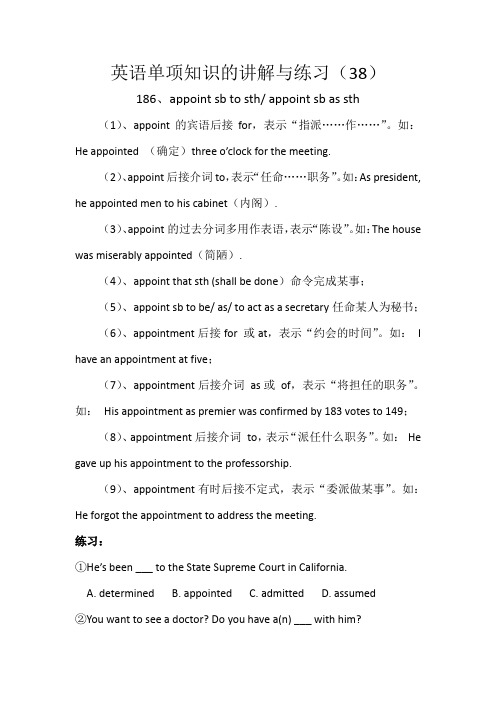英语单项知识的讲解与练习(84)
- 格式:docx
- 大小:22.55 KB
- 文档页数:10


英语单项知识的讲解与练习(123)611. envy 的用法envy 妒忌、羡慕。
例句:①They envy him his good fortune.他们羡慕他的好运气。
②I envy her ability to dance in front of a crowd.她在众人面前所展现的的舞技令我羡慕不已。
③He was filled with envy at my success.他对我的成功满怀羡慕。
④His new house was the envy of all his friends.他的新居成了所有朋友羡慕的对象。
短语:envy you your success/ envy your success/ envy you for your success/ envy you on account of your success 羡慕(妒忌)你的成功;the envy of somebody 某人的羡慕或妒忌;A’s envy of B,A 对B 的羡慕或妒忌;feel envy at 对……感到羡慕或妒忌;out of envy出于妒忌;hide her envy of me隐藏对我的妒忌;green with envy十分妒忌;be envious of羡慕……、妒忌……;envy sb. doing/for sth. 忌妒或羡慕某人做某事; with envy 羡慕地;忌妒地; be the envy of 是令人羡慕/忌妒的事物; envy at sb's success 羡慕某人的成功;in〔with〕envy 嫉妒;用法:①envy与the连用,表示羡慕、妒忌令人羡慕的人或物。
②envy和否定词连用时,常表示一种温和的惋惜、同情,也常表示庆幸自己未曾遭遇到对方那样的麻烦或不幸。
③envy作及物动词时,意思是“忌妒,羡慕”,后可接简单宾语、双宾语,也可以在宾语后接for加动名词等结构,但不能接从句。

英语单项知识的讲解与练习(112)556. deliver的用法delivervt.接生(小孩);递送;发表(演说等)例句:①The mailman delivers letters and parcels every morning.邮差每天早晨递送信件和包裹。
②He delivered a long prose.他发表了一篇冗长乏味的演讲。
③We deliver the goods in batches.我们分批交付货物。
④Education delivered him from ignorance.教育把他从无知中解救出来。
⑤She delivered twins in the evening.晚上她生了一对双胞胎。
短语:deliver a baby 接生小孩;生小孩; deliver sth. to...把某物送到…; express delivery 快递; on delivery送达时;货到时; deliver on one's pledge (or promise)履行诺言;deliver oneself of an opinion发表意见;deliver a blow at one's enemy给予敌人一个打击;deliver as 作为…播送;deliver sb from danger 救某人出险;deliver sb from pains 解除某人的痛苦;deliver sb into the hand of the police 把某人引渡给警察;deliver sb of fear 消除某人的恐惧;deliver on 履行,实行;deliver over to the police 把(某人)交给警察;deliver oneself to 向…投案自首;deliver to sb's house 送到家;用法:①deliver可用作不及物动词,也可用作及物动词。

英语单项知识的讲解与练习(98)486. compete的用法compete比赛、竞赛。
例句:①Companies must be able to compete in the marketplace.公司一定要在市场中有竞争力。
②Several companies are competing for the contract.几家公司正为争取一项合同而互相竞争。
③We can compete with the best teams.我们能与最好的队竞争。
短语:compete for为了……竞争;compete in race 赛跑;compete with/ against somebody for something与某人竞争以得到某物;compete in (a game, a match) 参加;在……方面竞争; be in competition with sb.和某人竞争; compete as 作为…称职;compete at 在…方面胜任;compete for championship 争夺冠军;compete for sb's work 工作称职;compete in a contest 参加比赛;compete in one's field 胜任自己的专业;compete to the task 能胜任…工作;compete with 同…竞争;用法:①compete的基本意思是“力图取胜”,指在比赛、辩论等有竞争活动中为征服或取胜而进行的努力,常暗示有奖赏刺激物。
②compete是不及物动词,接against表示“与…对抗”,接for表示“夺取…”,接with表示“对…抗争”。
比较:compete 表示“为了争得名次、奖金,合同等”,并不含有将对手征服的意思。
contest 所表示的竞赛可以是友谊赛,也可以是有敌意的竞赛,旨在比试技能、能力、力气、耐力等,此外还可以表示赢得选举。

英语单项知识的讲解与练习(38)186、appoint sb to sth/ appoint sb as sth (1)、appoint的宾语后接for,表示“指派……作……”。
如:He appointed (确定)three o’clock for the meeting.(2)、appoint后接介词to,表示“任命……职务”。
如:As president, he appointed men to his cabinet(内阁).(3)、appoint的过去分词多用作表语,表示“陈设”。
如:The house was miserably appointed(简陋).(4)、appoint that sth (shall be done)命令完成某事;(5)、appoint sb to be/ as/ to act as a secretary任命某人为秘书;(6)、appointment后接for 或at,表示“约会的时间”。
如:I have an appointment at five;(7)、appointment后接介词as或of,表示“将担任的职务”。
如:His appointment as premier was confirmed by 183 votes to 149;(8)、appointment后接介词to,表示“派任什么职务”。
如:He gave up his appointment to the professorship.(9)、appointment有时后接不定式,表示“委派做某事”。
如:He forgot the appointment to address the meeting.练习:①He’s been ___ to the State Supreme Court in California.A. determinedB. appointedC. admittedD. assumed②You want to see a doctor? Do you have a(n) ___ with him?A. meetingB. dateC. datingD. appointment③Have you made out your ___ for a passport?A. appointmentB. applicationC. appositionD. appreciation④Phone his secretary and make an appointment ___ him.A. forB. atC. withD. of⑤The headmaster a new director yesterday.A. appointedB. appointC. appointmentD. was appointed⑥If you want to meet him, you have to make an _____.A. appointedB. appointingC. appointmentsD. appointment187、appreciate your calling back(1)、appreciate 后接动名词,不接不定式,后不能接人称代词作宾语,要以事件为宾语。

英语单项知识的讲解与练习(29)141、no matter how hard it isno matter how ...引导让步状语从句,意为“无论多么……”,how 后跟形容词或副词,相当于“however + adj./adv.”句式。
no matter意为“无论;不管”时,引导让步状语从句,常用于下列句型中:no matter what (who/when etc. )... 分别表示“无论何事”、“无论何人”、“无论何时”等,这个从句可以置于主句之前,也可以置于主句之后。
no matter后接关系代词或关系副词引导的状语从句在句中作让步状语。
no matter what (who, which, where, when … )只能引导让步状语从句;whatever (whoever, whichever, whomever)既可引导让步状语从句,也可引导名词性从句。
no matter 引导的分句表达的是将来的含义,但形式上要用现在时。
如:No matter who will come (改为:comes);no matter 引导的分句不能作宾语或主语。
如:I’ll eat no matter what (改为:whatever) you give me;whichever意为“无论哪个;无论哪些”;whatever意为“无论什么;凡是……的事物”。
whichever可以引导名词性从句或让步状语从句,which是个疑问词;用在疑问句中,或作关系代词,引导定语从句。
no matter which只能引导让步状语从句;而whichever可引导让步状语从句和名词从句。
no matter which可以用whichever代替,但两个同时出现在选项中时,必须选whichever。
练习:①No matter ___ he said, I don’t like him.A. whatB. howC. thatD. why②No matter ___ you go, I will go with you.A. whatB. whichC. whereD. that③That student is discourteous; he complains ___ one tries to please him.A. howeverB. whateverC. no matter whatD. no matter how④_____ the problem may be, we must solve it ourselves.A. Whatever difficultB. How difficultC. However difficultD. No matter what difficult⑤It is generally considered unwise to give a child _____ he or she wants.A. howeverB. whateverC. whicheverD. whenever⑥We’ll eat at _____ restaurant has a free table.A. whichB. whateverC. whicheverD. no matter which⑦These wild flowers are so special that I would_____ do I can to save them.A. whateverB. thatC. whichD. whichever142、mind doing something(1)、mind doing something 通常用于疑问句、否定句和条件句等结构中,这个结构前还可加所有格定语。
英语单项知识的讲解与练习(81)401. candidate的用法candidate (n)候选人、投考者;例句:①There are three candidates for the vacancy.这一空缺有三名候选人。
②She had been nominated as candidate for the presidency.她已被提名为总统候选人。
③He made several favorable comments about their candidate.他对他们的候选人发表了一些有利的评论。
④Most candidates passed in grammar.参加考试的人大多数语法及格。
短语:as a candidate作为候选人;candidate for office公职候补者;candidate of a degree学位候选人;defeated〔failed〕candidate落选人员,不合格者;leading candidate主要候选人;selected candidate入选者;candidate for Presidency总统候选人,用法:candidate for后面一般加职业或者职位等,表示某方面的候选人。
如:John was the strongest candidate for the job.练习:①I guess Jones didn’t have a chance to win the election. Almost all of the people in the city voted for his ____.A. opponentB. candidateC. colleagueD. advocate②They’re interviewing three _____ for the post of sales manager.A. sponsorsB. candidatesC. advocatesD. opponents③They are interviewing candidates _____ the job of sales managers.A.ofB.aboutC.forD.in④This candidate does not _____ the requirement that secondary school should be completed.A.makeB.getC.takeD.meet402. caution 的用法caution (n)小心、谨慎、警告;例句:①The teacher gave Tom a caution and told him never to do it again.老师给了汤姆一次警告,叫他不许再那样做。
英语单项知识的讲解与练习(91)451. budget的用法budget预算、预案;例句:①Congress has approved the new educational budget.国会通过了新的教育预算。
②Our budget needs drastic revision.我们的预算需作重大修改。
③The government has budgeted 10000000 pounds for education spending.政府将10000000英镑编入教育预算。
④If we budget carefully, we'll be able to afford a new house.如果我们精打细算就能买一座新房子了。
⑤You can buy high-quality goods at budget prices there.你可以在那买到物美价廉的商品。
短语:a budget deficit预算赤字;a family budget家庭收支预算;budget one’s time安排自己的时间;budget for the coming year为下一年度编造预算;enlarge budgets 增加预算;exceed a budget 超出预算;annual budget 年度预算;weekly budget 每周的预算;business budget 营业开支;expense budget 开支预算;用法:budget用作名词的基本意思是“预算”,指计划着怎样花钱。
也可指政府一年一度的财政预算,还可指一项计划中的“预算额,经费”。
练习:①Our money is limited and we should ___ for the next year.A. saveB. spareC. limitD. budget②They earn a great deal, but they can’t balance their ___ because the wife is often ill.A. planB. budgetC. projectD. prediction③He is good at ___ his time.A. budgetingB. arrangingC. budgetD. A and B④His father makes a little money, but he can budget ___ his family.A. inB. onC. forD. with452. burn的用法burn燃烧、晒(干)。
英语单项知识的讲解与练习(120)596. earn的用法earnvt. 赚;挣得;获利;赢得;获得例句:①He has earned a lot of money in this month.这个月他已经赚了好多钱了。
②He works hard, but he does not earn much money.他工作很努力,但钱赚得不多。
③How does she earn her living?她靠什么谋生?④His skill in negotiating earned him a reputation as a shrewd tactician.他的谈判技巧使他赢得了精明战略家的名声。
⑤It has taken years to earn their trust.花了好多年才赢得他们的信任。
短语:earn one’s living=make a living 谋生; earn money= make money 挣钱; earn a good reputation 赢得一个好名声; earn sb. sth赢得某人某物;earn by 用…博得;earn by hard labour 靠辛勤劳动挣来的;earn by sweat and toil 靠血汗而挣得的;earn for sb 为某人博得;earn with 用…挣得;用法:①earn可用作及物动词,也可用作不及物动词。
用作及物动词时接名词或代词作宾语。
②earn作“使得到,使赢得”解时,其后还可跟双宾语,其间接宾语也可转化为介词for的宾语。
辨析: earn 侧重指依靠自己的劳动或因付出代价,有功而获得。
obtain 着重指通过巨大努力、要求得到所需或盼望已久的东西。
acquire书面用语,强调通过不断地、持续地努力而获得某物,也指日积月累地获得。
get一般用语,使用较广。
可指以任何方式得到某物,也不一定要经过努力。
gain侧重指经过努力或有意识的行动而取得某种成就,或指获得某种利益或好处。
英语单项知识的讲解与练习(100)496. conclusion的用法conclusion结束、结论、推论。
例句:①I found the conclusion of her story very exciting.我觉得她那故事的结尾很激动人心。
②Some found the conclusion of the film Titanic very disappointing.有些人觉得电影《泰坦尼克号》的结尾是令人失望的.③Your information is inaccurate and your conclusion is therefore wrong.你的信息不准确,所以你的结论是错误的。
④So far no correct conclusion has arrived at.到目前为止,还没有得出任何正确的结论。
短语:in conclusion 在结束时、最后;try conclusions with 和……决胜负;arrive at/ come to/ draw/ reach a conclusion得出结论;accept sb's conclusion 同意某人的结论;seek a conclusion to sth 设法了结某事;correct conclusion 正确的结论;painful conclusion 痛苦的结局;at the conclusion 在结尾;on the conclusion of the course课程结束时;conclusion of a book一本书的结尾;练习:(1). 单项填空:①Scientists have made a great ___ in the treatment of cancer.A. principleB. breakthroughC. conclusionD. introduction②___, I’d like to say how much I’ve enjoyed staying in your beautiful country.A. To concludeB. To be concludedC. In the conclusionD. As conclusion③After talking with him for a few minutes I ___ the conclusion that he was not fit for our work.A. went toB. came toC. turned toD. referred to④I’ve ____ the conclusion that he’s not the right person for the job.A. got toB. gone toC. come toD. arrived to(2). 完成句子:①我断定他不适合做这项工作。
英语单项知识的讲解与练习(84)416. criticize的用法criticize (v) 批评;挑剔;评论;非难;吹毛求疵例句:①You should not criticize him so harshly in his face.你不应该当面这么严厉地批评他。
②Basicly there is nothing to criticize in his works.他的作品基本上无可挑剔。
③Would you like to read and criticize my new novel?您愿意阅读并评论一下我的新小说吗?④He is too ready to criticize others.他很喜欢评论别人。
⑤He criticized me for not finishing the work in time.他因我未及时完成该工作而非难我。
短语:criticize unsparingly毫不留情地批评;criticize by name 点名批评;criticize sb for因…批评某人;criticize sb for doing sth批评某人做某事;criticize sb for shoddy work批评某人工作粗枝大叶;用法:①criticize的基本意思是“评论”,指识别某人或某物的优缺点,有时还含有非难或挑剔的意味。
②criticize既可用作不及物动词,也可用作及物动词。
用作及物动词时,常接人、理论、路线等作宾语,很少接“懒惰”“急躁”等作宾语。
③criticize后不能接that引起的从句。
如:He criticized (去that) the story lacked(改为for lacking) interest. 其宾语后接介词as,表示“非难”。
如:Scheme was criticized as too impractical. 接for,表示“因……而批评”。
如:The mother criticized her son for being lazy.练习:①If I criticize someone,I will do it with great patience as if I were the one _____.A.to criticizeB.criticizingC.having criticizingD.being criticized②Generally speaking, I never show ____for students who get caught cheating in exams.A. assistanceB. criticismC. sympathyD. confidence③Miss Price began to criticize _____ Philip had done.A.whatB. thatC. whichD.where④I am really tired of his constant criticizing.A.to criticizeB.criticizingC.having criticizingD.being criticized417. curse的用法curse (v/ n)诅咒;例句:①Our tribe is under a curse.我们的部落正受诅咒。
②He muttered a curse at the other driver.他低声咒骂另一位开车的人。
③Foxes can be a curse to farmers.狐狸可给农民带来祸害。
④The Fore knew kuru as a curse cast by sorcerers.弗尔族人认为,库鲁是由男巫发出的诅咒。
⑤He cursed the waiter who had spilled soup on him.他咒骂那个把汤溅在他身上的男侍者。
短语:not care/ give a curse毫不在乎;under a curse被咒骂;lay sb under a curse诅咒某人;curse of drink饮酒的祸害;curse to对…是祸因;curse for因…而咒骂;curse sb for his clumsiness 咒骂某人笨手笨脚;用法:curse的意思是“咒,骂”,可接名词或代词作宾语,也可接同源宾语。
还可接as+ n. 作补足语的复合宾语, as不可省略。
作动词可用于被动结构中,后接with,表示“因……而遭殃”。
如:He is cursed with a violent temper.练习:①Mr. White tried to _______ this job through the influence of his father.A. harnessB.fetchC.curseD.obtain②The shop assistant was dismissed as she was ________ of cheating customers.A. accusedB. chargedC. scoldedD. cursed③For years now, the people of that faraway country have been cruelly ______ by a dictator.A. depressedB. immersedC. oppressedD. cursed④She cursed him _____ ruining her life.A. ofB. forC.withD.to418. attention的用法attention注意。
例句:①She soon becomes the centre of attention.她很快成为大家注意的人物。
②You should focus your attention on your work.你应该把注意力放到工作上。
③She gave her aging parents much attention.她悉心照料年迈的双亲。
短语:pay attention to something = give one’s attention to something 注意某事draw one’s attention 引起某人的注意;bring something to one’s attention 使某人注意某事;cal l one’s attention to something叫某人注意某事;listen with attention 专心听;at/ to attention立正、不动;catch/ attract/ draw one’s attention to吸引某人的注意力;devote one’s attention to专心于;call attention to唤起对……的注意;turn attention to将注意力转向……;fix one’s attention on/ upon将注意力集中在……;f ocus one’s attention on sth = fix one’s attention on sth把注意力集中在某事上;focus on sth把注意力集中于某事;the focus of attention焦点、中心;用法:①一般来说,要表达引起某人对某事的注意时,用call/draw one's attention to。
表示用某事引起某人注意时,用bring the matter to one's attention,注意两者不可倒过来使用。
如:He wants to call her attention to the matter.他想引起她对这事情的注意。
不可以说I want to bring his attention to the matter.②pay attention to是固定的搭配词组,不可以用其他介词替换,如pay attention on。
除了指“注意”,pay attentionto还指“向女子献殷勤”,如pay his attentions to the girl.要注意his后的attentions用的是复数形式;attention 前可加great, little, much, special, no等修饰词。
③有时候pay attention to后不直接加宾语,而是加动名词,to作为介词。
如:I advise you to pay more attention to recording new uses of old words.我建议你要更注意记录旧词的新用法。
练习:①The exciting performances attracted the passers-by’s ___.A. noticeB. attentionC. patienceD. taste②The girl didn’t even look up; all her attention was ___ on the pretty doll.A. fixedB. paidC. givenD. drawn③Pay attention to ___ everything ready before dark.A. getB. gettingC. makeD. making④When he was in his forties he ___ attention to the development of agriculture.A. drewB. calledC. fixedD. caught⑤The children’s attention was suddenly ___ the passer-by who had a funny hat on and ___ strange clothes.A. drawing to; wearingB. drawn to; woreC. drawn; wearingD. drawing; wore⑥Students, who are better at class, always ___ more attention on what the teachers teach them than those who are not good at it.A. payB. fixC. drawD. attract⑦Much attention should be paid ___ people’s living conditions.A. in improvingB. to improveC. improvingD. to improving419. attitude的用法attitude 态度、看法。